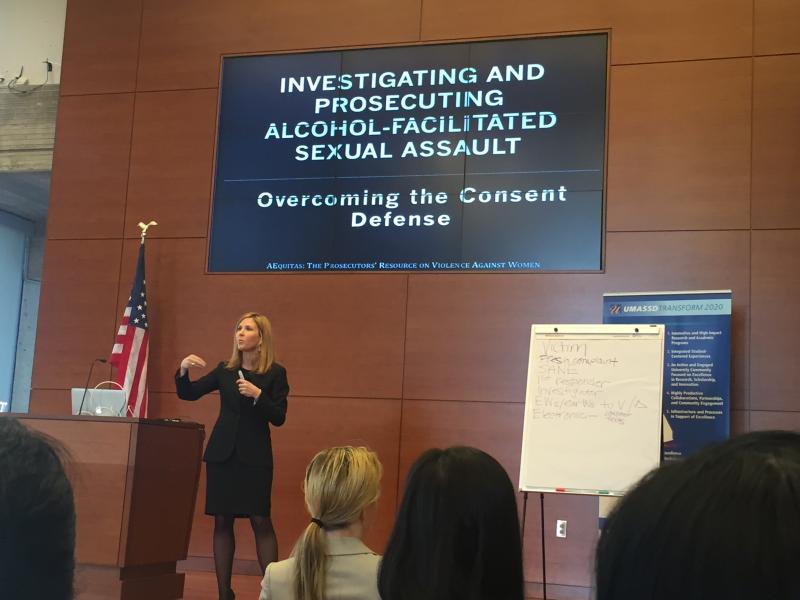Women's center seeks more involvement from district attorney in sexual assault cases on campus
A sexaual assault case has never made it to trial in her 21 years at the University of Massachusetts Dartmouth, said the director of the Center for Women, Gender & Sexuality Juli Parker.
It’s why she asked attorney advisor Viktoria Kristiansson to speak at the UMass campus on May 20—to help bridge the university with the district attorney’s office.
Parker said that without the tools to address alcohol-facilitated sexual assault, prosecutors shy from college campuses. “The point is to help prosecutors get around the defense saying ‘she consented.’”
In the university’s library, 40 attorneys, police officers, advocates, and health service personnel listened to Kristiansson break down common misunderstandings about how a victim behaves, how an attacker behaves, the effects of alcohol on both men and women, how to dissolve a jury's preconceived notions, and how to better help a victim so that—even if they lose the case—the victim still feels supported by the justice system.
“If the college has a better understanding of the process, the victim feels more supported and is more likely to engage with law enforcement,” said Kristiansson. This way, faculty have a go-to for answering questions and prosecutors see what is happening on college campuses, said Kristiansson.
Kristiansson presented staggering facts like only six percent of rape victims sustained severe physical injuries (Office of Justice Programs, 2002) and over six percent of participants in a student survey took credit for 439 rapes and attempted rapes, 49 sexual assaults, and 277 acts of sexual abuse against children (Lisak and Miller, 2002).
“In general, we’re trying to subvert rape culture,” said Parker, explaining that the concept of rape culture demonstrates how society normalizes male sexual violence and blames victims of sexual assault.
The center’s victim advocate Kendra Tomase said five to six students per semester come to her with sexual assault.
“There’s shame involved in this. There’s fear. But I think this training will help us in addressing these issues,” said Bristol County district attorney Thomas Quinn at the conference.
Parker said she would like to have Tom Tremblay on campus next. "He teaches cops how to interview victims, so why can't he teach lawyers how to interview victims?" she asked.
Kristiansson works for AEquitas: The Prosecutors' Resource on Violence Against Women, a nonprofit specialized in training prosecutors to objectively evaluate their approach in sexual assault, stalking, and human trafficking cases.













